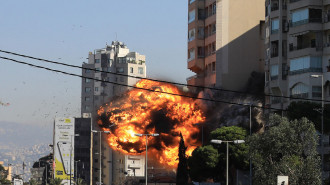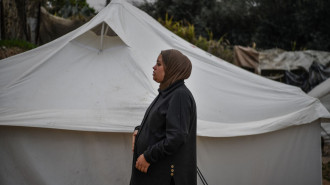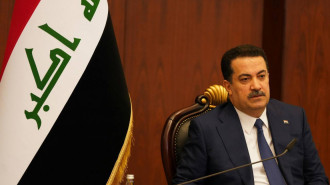Migrants, police scuffle at Greek camp after 'border rumour'
Hundreds of asylum seekers on faced off against riot police outside a camp in northern Greece on Thursday after an online call for a march to the border with North Macedonia, officials said.
Authorities at the camp of Diavata outside Thessaloniki said entire families, some with small children in tow, had travelled from other parts of the country with the apparent intention of setting off for the border with North Macedonia, some 100 kilometres (60 miles) to the north.
They began gathering in the afternoon after a rumour spread on social media that human rights groups would assist them in crossing the border into the neighbouring country, officials said.
A brief scuffle broke out when riot police were dispatched to keep the Diavata camp residents from joining the crowd outside, with some migrants throwing objects and police responding with tear gas.
At least three people were detained, reports said.
"Unfortunately, some asylum seekers in northern Greece were misled by misinformation circulating on social media despite warnings by camp authorities," a migration ministry source told state agency ANA.
The UN refugee agency has also "issued warnings on the dangers of illegal (border) crossings" and took steps to dispel the rumour, Stella Nanou, a spokeswoman for the agency, told ANA.
In 2016, a sprawling tent city formed at the border town of Idomeni, a bottleneck where 8,000 people mainly from Syria, Iraq and Afghanistan were stranded after other EU countries began shutting their borders.
The improvised camp was eventually cleared by Greek authorities and the migrants and refugees were relocated to organised facilities around the country.
More than 70,000 refugees and migrants are believed to live in Greece in the wake of a mass influx beginning in 2015, mainly fuelled by the Syrian civil war.
'New era'
In February, European and Arab leaders ended their first summit pledging to launch a "new era" of cooperation on a range of topics, including migration, despite sharp differences over human rights.
Around 40 EU and Arab leaders stressed at their two-day summit in the Egyptian Red Sea resort of Sharm el-Sheikh how their challenges were interlinked and required joint efforts to meet them.
In a final statement, the leaders pledged to "embark on a new era of cooperation and coordination" that would boost stability and prosperity in both regions and beyond, all within a rules-based international order.
Both sides agreed the need to work together to manage migrant and refugee flows as well as fight extremists, though Europe is itself divided on migration.
More than one million people, most of them fleeing the war in Syria, entered the bloc in 2015. Eastern EU governments have refused to admit asylum seekers landing in front line states like Italy and Greece.
Conflict-wracked Libya meanwhile is used as a staging area by smugglers and traffickers to take economic migrants and asylum seekers to Italian shores.
Follow us on Twitter: @The_NewArab







 Follow the Middle East's top stories in English at The New Arab on Google News
Follow the Middle East's top stories in English at The New Arab on Google News


